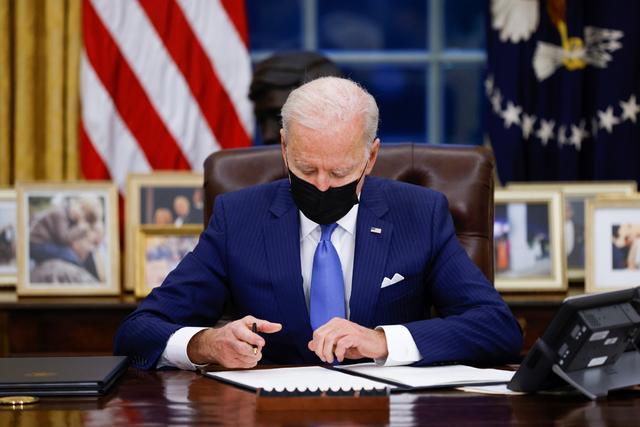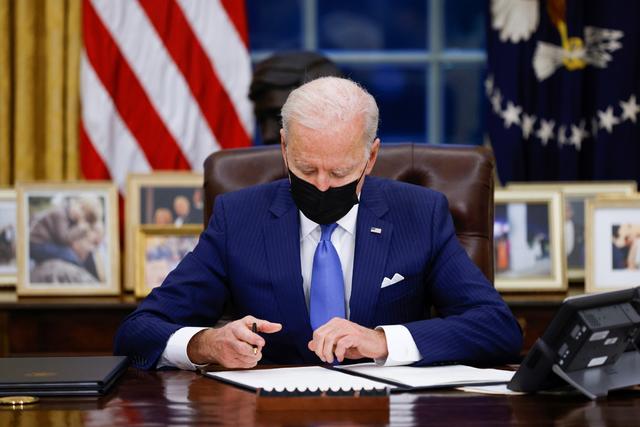2021加拿大官宣40万移民配额!大专学历即可申请移民
自从加拿大颁布百万移民计划后,陆续有不少移民和签证利好消息发出。近日,加拿大总理特鲁多向移民部长门迪奇诺(Marco Mendicino)签发了新补充的移民任务授权书(New Supplementary Mandate Letter),授权书强调,移民仍将是加国经济和社会发展的中心任务
作者:兰顺正
首发自:中国日报

拜登试图扭转其前任唐纳德·特朗普的强硬、倒退政策,包括他试图改革美国移民制度的努力,在他担任总统的第一周就遭遇了挫折。
1 月 26 日,得克萨斯州的一名联邦法官临时阻止了拜登的 100 天驱逐令。然而,几天后,拜登公布了重大的移民改革——正式命名为《 2021 年美国公民身份法案》( US Citizenship Act of 2021 ),如果该法案成为法律,将为超过 11000000 名无证移民提供八年的入籍途径。
该法案还将保留并加强前总统巴拉克奥巴马( Barack Obama )在 2012 年推出的“儿童入境暂缓遣返计划”( Deferred Action for Childhood Advances Program ),允许在美国非法居留的个人在儿童时期被带到美国后,获得可延长的两年暂缓遣返期,并有资格获得工作许可。
2 月 18 日,拜登和国会民主党人向国会提交了公民法案,以通过成为法律。白宫援引拜登的话称:“我向国会提交的法案将给移民系统带来迫切需要的变革,而移民系统早就该进行改革了。它将以明智的投资负责任地管理边界。它将解决来自中美洲的非正常移徙的根源。它将使我们的合法移民途径现代化,并为包括梦想家、农场工人和 TPS (临时保护身份)持有者在内的众多人创造一条获得公民身份的途径。”
拜登曾表示,如果可以批准单独的主要内容,他可能会接受一种更加零敲碎打的方式。
另外,拜登政府 2 月 18 日发布的执法指南将更直接地针对在美国非法居住并构成威胁的人实施移民执法。这也将是特朗普政府更广泛的移民和海关执法政策的逆转。
在 2 月的第一周,拜登又签署了三项移民行政命令。第一个项目成立了一个由国土安全部部长领导的特别工作组,该工作组将致力于让在特朗普政府统治下在边境离散的家庭团聚。第二个是调查美国南部边境的根本人道主义问题。第三任总统下令全面审查前任政府的移民政策。
然而,拜登在扭转特朗普时代的限制性移民政策方面可能面临着内部和外部的压力。例如,在 11 月破坏性的飓风肆虐中美洲部分地区之后,许多人无家可归,失业。拜登解除移民禁令的承诺可能鼓励他们前往美国寻求更好的生活。
特朗普政府采取了最严厉的限制移民措施,包括在与墨西哥的边境修建隔离墙,对移民采取“零容忍”政策,驱逐民众和分离家庭,禁止七个穆斯林国家的人进入美国。
2018 年 10 月,数千名来自中美洲国家的人向美国进军,特朗普派士兵前往美墨边境,威胁要使用武力阻止他们进入美国。
而在 2020 年 COVID - 19 疫情在美国达到高峰时,特朗普以疾病预防和控制的名义进一步收紧了移民规则。的确,川普用反移民规则来取悦他的支持者。
拜登持相反观点。他认为移民是美国文化的一个重要特征,认为移民作为劳动力的重要组成部分,为美国经济做出了贡献。
拜登还采取了一些其他措施来扭转特朗普的移民规则,包括停止修建边境墙。然而,推动他雄心勃勃的移民政策并非易事。特朗普修改并执行了 400 多项移民规则,其中一些规则相互重叠,这让拜登的政策改革成为一项极具挑战性的任务。
特朗普政策的全面改变将对美国移民体系产生巨大影响,可能会鼓励移民潮涌向美国。尽管移民倡导团体向拜登施压,要求他允许数万名因特朗普政策而受阻的移民入境,但宽松的移民政策可能会给美国社会带来新的问题。接受难民会给美国经济增加压力,而无限制的难民流动会为恐怖分子潜入美国创造机会。
2016 年特朗普的竞选纲领之一就是禁止非法移民入境,他赢了。更糟糕的是,这种流行病促使更多的美国人避开(相当憎恨)移民,关闭边境以切断新型冠状病毒的传播链的想法在美国获得了更多的支持者。
拜登政府意识到改革移民制度的困难,也知道这是一个需要巨额资金的长期过程。
就潜在移民而言,他们应该知道简化移民规则是一项艰巨的任务,因此不应对拜登在短期内兑现所有移民承诺过于乐观。
瓜州:移民张华林家的幸福生活
张华林一家1996年从青海省海东市民和回族土族自治县搬迁到瓜州县三道沟镇五四村,如今已有25个年头。住宅从开始的土坯房到如今的砖瓦房,收入从开始全靠种地,如今搞规模养殖,张华林的生活发生着翻天覆地的变化,日子也越来越有奔头。 刚来瓜州,语言不通,
(以下为英文原版)
Immigration reform a tough task for Biden
By Lan Shunzheng | China Daily

US President Joe Biden's efforts to reverse his predecessor Donald Trump's hard-line, regressive policies, including his attempt to reform the US immigration system, encountered bumps in the very first week of his presidency.
On Jan 26, a federal judge in Texas temporarily blocked Biden's 100-day deportation moratorium. However, days later Biden unveiled hefty immigration reforms-formally named the US Citizenship Act of 2021-which would include providing an eight-year path to citizenship for more than 11 million undocumented immigrants if it becomes law.
The act will also preserve and strengthen the Deferred Action for Childhood Arrivals program introduced by former president Barack Obama in 2012 to allow individuals with unlawful presence in the US after being brought to the country as children to receive a renewable two-year period of deferred action from deportation and become eligible for a work permit.
On Feb 18, Biden and congressional Democrats submitted the citizenship act to Congress for passing into law. The White House quoted Biden as saying:"The legislation I sent to Congress will bring about much needed change to an immigration system where reform is long overdue. It will responsibly manage the border with smart investments. It will address the root causes of irregular migration from Central America. It will modernize our legal immigration pathways and create an earned path to citizenship for so many-including Dreamers, farmworkers and TPS (temporary protected status) holders."
Biden has said that he may accept a more-piecemeal approach if separate major elements could be approved.
Separately, enforcement guidelines released on Feb 18 by the Biden administration will target immigration enforcement more directly at people living illegally in the country who pose a threat. That, too, will be a reversal from the broader targeting policy of Immigration and Customs Enforcement under Trump.
In the first week of February, Biden signed three more executive orders on immigration. The first created a task force led by secretary of homeland security that will work to reunite families that were separated at the border under the Trump administration. The second was to investigate the root humanitarian issues at the US' southern border. And the third ordered a full review of the previous administration's immigration policies.
Biden, however, may face internal and external pressures in reversing the Trump-era restrictive immigration policies. For example, after devastating hurricanes wreaked havoc in parts of Central America in November, many people were left homeless and jobless. And Biden's promise to lift immigration bans could encourage them to head toward the US in search of a better life.
The Trump administration took the toughest possible measures to restrict immigration, including building the wall along the border with Mexico, adopting a "zero tolerance" policy on immigration, deporting people and separating families, and banning people from seven Muslim countries from entering the US.
When thousands of people from Central American countries marched toward the US in October 2018, Trump sent soldiers to the US-Mexico border threatening to use force to stop them from crossing into the US.
And when the COVID-19 pandemic was at its peak in the US in 2020, Trump further tightened immigration rules in the name of disease prevention and control. Indeed, Trump used anti-immigration rules to please his supporters.
Biden holds the opposite view. He regards immigration as a key feature of American culture and considers immigrants as an important part of the labor force that contributes to the US economy.
Biden has also taken some other measures to reverse Trump's immigration rules, including halting the construction of the border wall. Yet it will not be easy for him to push forward his ambitious immigration policies. Trump modified and implemented more than 400 immigration rules, some overlapping each other, which makes Biden's policy reform a very challenging task.
A sweeping change of Trump's policies will have a huge impact on the US immigration system and could encourage waves of immigrants to head to the US. While immigration advocacy groups are pressuring Biden to allow entry to tens of thousands of immigrants blocked by Trump's policies, lax immigration policies could create new problems for US society. Accepting refugees will put added pressure on the US economy, and unrestricted flows of refugees can create opportunities for terrorists to slip into the country.
One of Trump's election planks in 2016 was banning the entry of illegal immigrants and he won. Worse, the pandemic has prompted more Americans to shun (rather hate) immigrants, and the idea of closing borders to cut the transmission chains of the novel coronavirus has gained more supporters in the US.
The Biden administration realizes the difficulties of reforming the immigration system, and knows that it is a long-term process that requires huge funds.
Potential immigrants, on their part, should know that streamlining immigration rules is a difficult task and therefore should not be overoptimistic about Biden fulfilling all his immigration promises in the short term.
移民咨询微信号:fczg336 或联系:whatsApp:+852 54843678 本文源自头条号:苍蓝观察 如有侵权,请联系删除。
「加拿大」将接纳123万新移民!联邦自雇的形式最具性价比
目前,加拿大政府欢迎新移民。 2020年10月30日的最新报告显示,预计未来三年将接纳123万新移民,他们之中2021年和2022年的配额将比前一份报告增加30,000人!最近,加拿大通过联邦快速通道(Federal Fast Track)一次邀请了27,000名申请人! 在加拿大众多的移